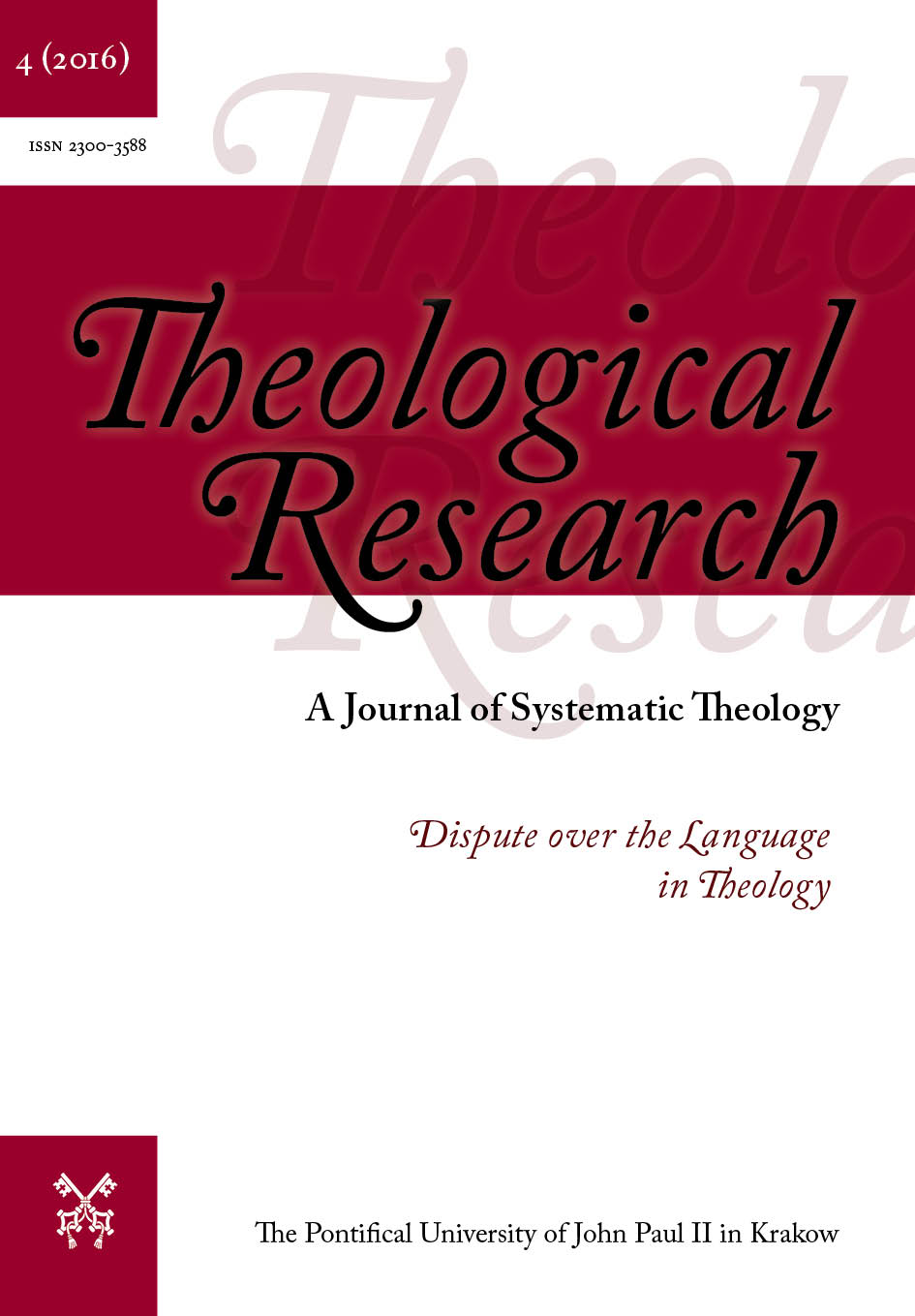Naming God: Christian Philosophy of Language, Wierzbicka’s Natural Semantic Metalanguage and Intercultural Dialogue
DOI:
https://doi.org/10.15633/thr.2375Słowa kluczowe:
philosophy of language, theolinguistics, linguistics, semantics, Cappadocians, accommodationAbstrakt
Who is He, to Whom we address words God, Theos, Deus, etc.? How far goes possibility for adaptation of religious and philosophical language from other (non-Western) cultures? Do people, by using certain words and terms, denote being of God, or are they just conventional names? Those questions were raised quite early in theological debates in early stages of Christianity, and answers were given by such prominent Church Fathers as Gregory of Nyssa and Basil the Great. The problem resurfaced millennium later, when Western missionaries encountered nations and people whose religious and philosophical concepts were far different from their own. Should they accommodate local terms to fit the Christian concept of God, or should they introduce Western terminology? This translational and linguistic problem leads to the question: are there universal concepts which (despite of cultural affiliation, based on the common human experience) could communicate the Christian idea of God? Findings of Wierzbicka, and her own claim is: yes – there are semantic primes, through which we can translate our ideas (with minor imperfections). But this last question goes beyond the reach of mere secular linguistics, and enters the domain of theology. For it is theological claim that in our human nature we are capable of addressing Triune God.Bibliografia
Basil the Great, De Spiritu Sancto, in: Ph. Schaff, H. Wace (eds.), A Select Library of the Nicene and Post-Nicene Fathers of the Christian Church [Second Series], vol. 8: Basil: Letters and Selected Works, trans. rev. B. Jackson, Peabody 1995, p. 1–50.
Blumczyński P., Turning the Tide: A Critique of Natural Semantic Metalanguage from a Translation Studies Perspective, Translation Studies 6 (2013) no. 3, p. 261–276.
Eco U., The search for perfect language, trans. J. Fentress, Oxford 1995.
Elison G., Deus Destroyed: The Image of Christianity in Early Modern Japan, Cambridge–London 1988.
Gregory of Nyssa, On “Not Three Gods”, in: Ph. Schaff, H. Wace (eds.), A Select Library of the Nicene and Post-Nicene Fathers of the Christian Church [Second Series], vol. 5: Gregory of Nyssa: Dogmatic Treatises, etc., trans. W. Moore, H. Austin Wilson, Peabody 1995, p. 331–336.
Gregory of Nyssa, On the Holy Trinity, in: Ph. Schaff, H. Wace (eds.), A Select Library of the Nicene and Post-Nicene Fathers of the Christian Church [Second Series], vol. 5: Gregory of Nyssa: Dogmatic Treatises, etc., trans. by W. Moore, H. Austin Wilson, Peabody 1995, p. 326–330.
Grodecki T., Wprowadzenie, in: Grzegorz z Nyssy, Drobne pisma trynitarne, Kraków 2004.
Higashibaba I., Christianity in Early Modern Japan: Kirishitan Belief and Practice, Boston–Leiden–Köln 2001.
Hosne A. C., The Jesuit Missions to China and Peru, 1570–1610: Expectations and Appraisals of Expansionism, New York 2013.
Hossein Nasr S. et al. (eds.), The Study Quran: New Translation and Commentary, New York 2015.
John Paul II, Slavorum Apostoli, Rome 1985.
Nosco P., Secrecy and the Transmission of Tradition: Issues in the Study of the “Underground” Christians, Japanese Journal of Religious Studies 20 (2003) no. 1, p. 3–29.
Origen, Against Celsus, II. 4, trans. rev. F. Crombie, D.D. in: Ph. Schaff, H. Wace (eds.), The Ante-Nicene Fathers: Translations of the Writings of the Fathers down to A.D. 325, vol. 4: Tertullian, part fourth; Minucius Felix; Commodian; Origen, parts first and second, Peabody 1995, p. 395–669.
Saeki P. Y., The Nestorian Monument in China, London–New York–Toronto 1928.
Stang C. M., Apophasis and Pseudonymity in Dionysius the Areopagite: “No longer i”, Oxford 2012.
Strzelczyk G., Teraz Jezus: na tropach żywej chrystologii, Warszawa 2007.
Turnbull S., Kakure Kirishitan of Japan: A Study of Their Development, Beliefs and Rituals to the Present Day, London–New York 1998.
Whelan C., The Beginning of Heaven and Earth: The Sacred Book of Japan’s Hidden Christians, Honolulu 1996.
Wierzbicka A., Goddard C., Lexical Semantics Across Domains, Languages and Cultures, Oxford 2014.
Wierzbicka A., Jak można mówić o Trójcy Świętej w słowach prostych i uniwersalnych, Lublin 2004.
Wierzbicka A., Semantics, Culture, and Cognition: Universal Human Concepts in Culture-Specific Configurations, New York–Oxford 1992.
Wierzbicka A., What Did Jesus Mean? Explaining the Sermon on the Mount and The Parables in Simple and Universal Human Concepts, New York 2001.
Pobrania
Opublikowane
Numer
Dział
Licencja
Autrzy publikujący w czasopiśmie "Theological Research" zgadzają się na następujące zasady:
a. Autorzy przenoszą na rzecz Uniwersytetu Jana Pawła II w Krakowie (UPJPII) autorskie prawa majątkowe do swoich tekstów.
b. UPJPII udostępnia teksty na platformie wydawniczej, na licencji Creative Commons Uznanie autorstwa-Użycie niekomercyjne-Bez utworów zależnych 3.0 Polska, która umożliwia ich pobieranie i udostępnianie (np. w repozytoriach naukowych), o ile zostaną spełnione warunki:
- podany autor i tytuł tekstu,
- podane miejsce publikacji (tytuł czasopisma i adres internetowy do oryginalnie opublikowanego tekstu),
- tekst będzie dystrybuowany w sposób niekomercyjny.

